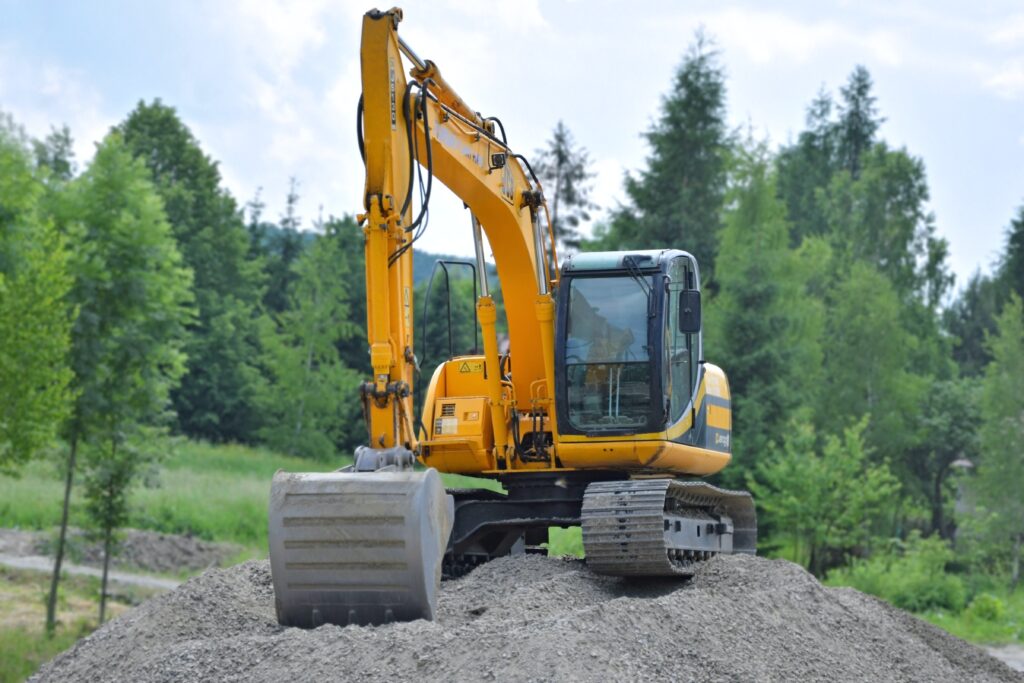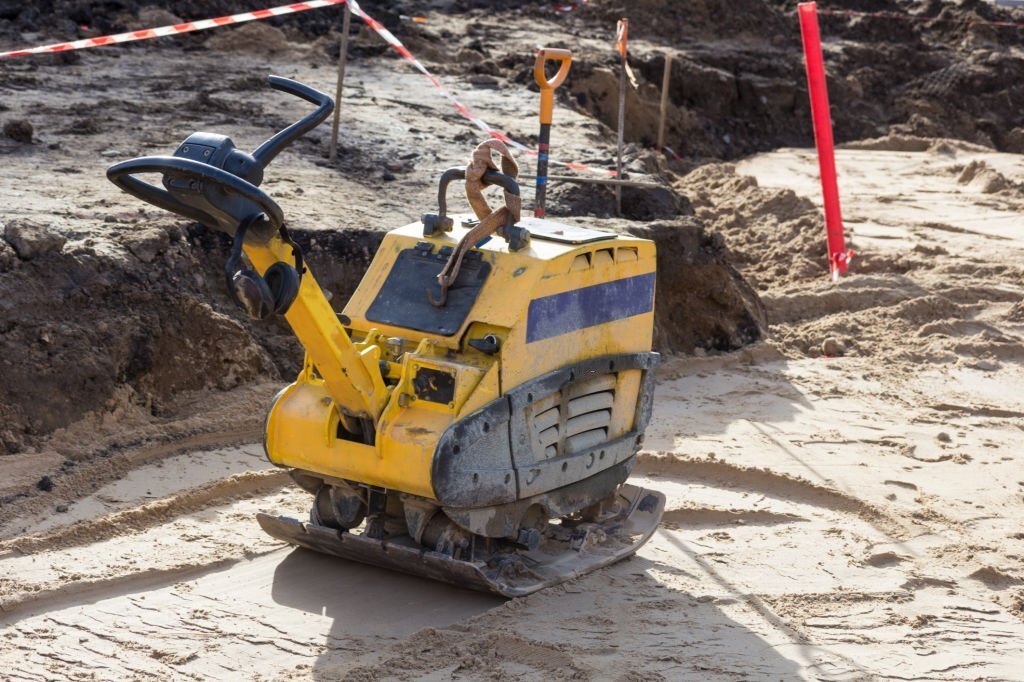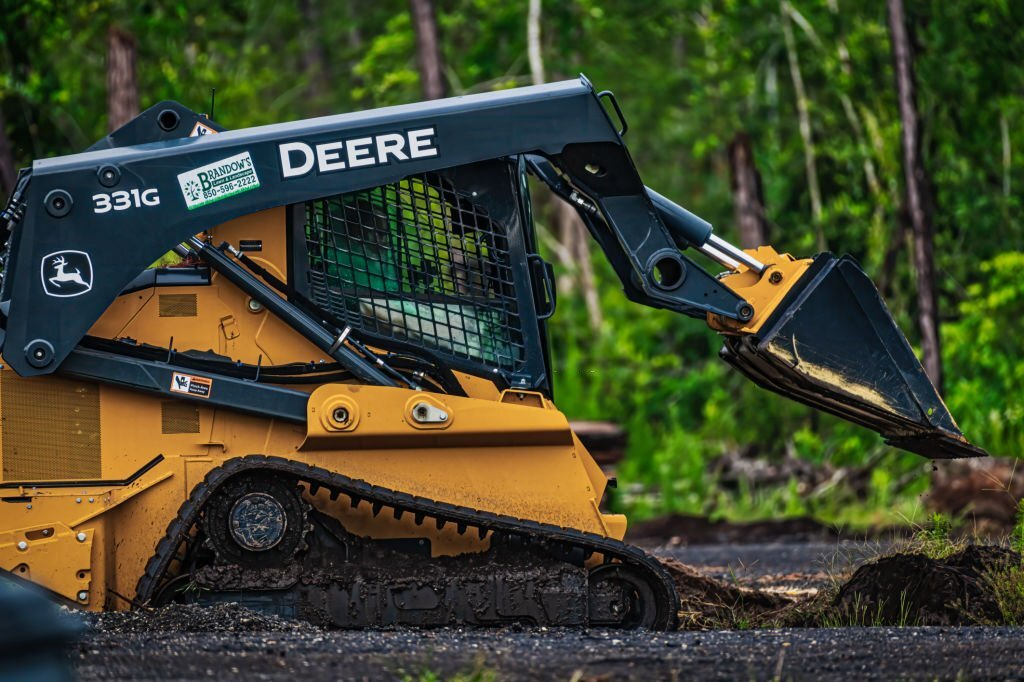
As an excavator owner, you know that proper maintenance is crucial for the performance and longevity of your equipment. However, determining how often to service your excavator can be a bit of a challenge, as it depends on several factors such as usage, operating conditions, and the specific make and model.
In this article, we’ll delve into the factors affecting service intervals, provide general guidelines for servicing, and discuss common maintenance tasks you should be performing. We’ll also emphasize the importance of record-keeping and highlight the benefits of proper excavator servicing.
Factors Affecting Service Intervals
While it’s crucial to maintain your excavator, several factors can influence how often you’ll need to service it.
Service costs can vary depending on the make and model of your excavator, as well as the specific components that need to be serviced or replaced.
It’s essential to consider the type of work and environment your excavator is being used in, as harsher conditions may require more frequent maintenance to ensure optimal performance and prevent costly breakdowns.
Additionally, the age and overall condition of your excavator will also play a significant role in determining how often it needs servicing.
General Guidelines for Servicing
Curious about maintaining that mighty earthmover of yours in top condition? Following general guidelines for servicing your excavator can help ensure its optimal performance and extend its lifespan.
It’s important to keep in mind that these guidelines may vary depending on factors such as the make and model of your equipment, its age, and the specific conditions it operates in. That being said, a good rule of thumb is to perform a basic service every 250 operating hours, with more thorough maintenance checks at 500, 1,000, and 2,000-hour intervals.
Common Excavator Maintenance Tasks
Don’t know where to start with excavator maintenance tasks? No worries, we’ve got you covered.
Regular maintenance is crucial to keep your excavator running smoothly and efficiently. One of the first things you should do is inspect and maintain your excavator attachments. This includes checking for wear and tear, cracks, and loose connections on buckets, teeth, and other components. Ensure that pins and bushings are well lubricated to minimize friction and increase the lifespan of these parts.
The Importance of Record Keeping
Understanding the importance of record-keeping for your excavator is crucial for its optimal performance and longevity. By keeping a detailed maintenance log, tracking service history, and monitoring performance metrics, you’ll be able to identify potential issues before they become serious problems and ensure your machine operates at its best.
Start taking charge of your excavator’s health today by maintaining accurate and up-to-date records.
Keeping a Maintenance Log
Maintaining a detailed maintenance log for your excavator is crucial, as it not only helps track service intervals but also increases the machine’s efficiency and longevity. Some of the maintenance log benefits include better planning for future repairs, detecting recurring issues, and helping to ensure that you comply with warranty requirements.
To make the most out of your maintenance log, consider incorporating log organization tips such as using a digital platform or binder system, categorizing entries by component or date, and recording all maintenance tasks, no matter how small.
Tracking Service History
Keeping track of the service history of the excavator allows you to visualize its overall health and performance, ensuring it’s always in top-notch condition and ready for any task. By maintaining detailed service documentation, you can easily identify patterns or potential issues that may arise over time. This can help you avoid unexpected breakdowns and costly repairs, as well as extend the life of your equipment.
Monitoring Performance Metrics
Closely monitoring performance metrics not only keeps the machinery running smoothly, but it also helps identify potential issues before they become major problems. Keeping an eye on key performance indicators (KPIs) such as fuel consumption, hydraulic pressure, and engine temperature can provide crucial insights into your excavator’s overall health.
The Benefits of Proper Excavator Servicing
You’ll experience numerous benefits from proper excavator servicing, such as improved efficiency, reduced downtime, and increased lifespan of the equipment.
By regularly maintaining your excavator, you’re investing in its longevity and ensuring that it stays in top-notch working condition. The cost of servicing your excavator pales in comparison to the potential expenses you could face if your equipment breaks down or needs major repairs due to neglect. Plus, a well-maintained machine will retain its value better, making it a more attractive asset when it’s time to sell or trade it in.
Excavator Maintenance Frequency: Key Tips to Extend Service Life

Excavators are robust machines designed to handle tough jobs on construction sites and in various other industries. To ensure these heavy-duty workhorses continue to perform efficiently and have a long service life, regular maintenance is crucial. In this article, we will delve into the importance of excavator maintenance, including the frequency of maintenance tasks, essential components to focus on, and tips to lower operating costs.
1. The Significance of Excavator Maintenance
Routine maintenance is the backbone of any well-operating excavator. Neglecting maintenance can lead to breakdowns, costly repairs, and reduced machine lifespan. Here’s how regular maintenance benefits your excavator:
2. Engine Oil and Hydraulic System
Engine Oil: Regularly checking and changing engine oil is vital to ensure your excavator’s engine operates smoothly. Engine oil lubricates moving parts and helps dissipate heat. Refer to the operation and maintenance manual for recommended oil change intervals.
Hydraulic System: The hydraulic system is the heart of your excavator, responsible for its digging and lifting capabilities. Regularly inspect hydraulic hoses and fittings for leaks or damage. Check and maintain the hydraulic fluid levels as per the manufacturer’s recommendations.
3. Preventive Maintenance Plan
A well-thought-out preventive maintenance plan is key to extending your excavator’s service life. This plan should outline the maintenance tasks to be performed at regular intervals. It should include daily, weekly, monthly, and annual checks and services.
4. The Role of the Operation and Maintenance Manual
The operation and maintenance manual provided by the excavator’s manufacturer is a valuable resource. It contains detailed instructions on maintenance procedures, recommended service intervals, and troubleshooting tips. Familiarize yourself with this manual and follow its guidance.
5. Fuel System and Fuel Tank
Fuel System: Maintain the fuel system by regularly changing fuel filters and draining the water separator to prevent contamination. Ensure that the fuel system is free from leaks, which can be a fire hazard.
Fuel Tank: Periodically inspect the fuel tank for rust or damage. A damaged fuel tank can lead to fuel leaks and potentially hazardous situations. Promptly repair or replace damaged fuel tanks.
6. Lowering Operating Costs Through Maintenance
Routine maintenance may seem like an expense, but it can significantly lower your operating costs in the long run. Regularly serviced excavators are less prone to breakdowns, require fewer costly repairs, and have a longer service life.
7. Maintenance Tips for Excavators
Pressure Washer: Use a pressure washer to clean your excavator regularly. Removing dirt, mud, and debris helps prevent corrosion and keeps components in good condition.
Daily Inspections: Before each operation, conduct a visual inspection of your excavator. Check for loose or damaged parts, leaks, and signs of wear and tear.
Greasing Components: Lubricate moving parts, such as pins and bushings, as recommended by the manufacturer. Proper lubrication reduces friction and extends component life.
8. Maximizing Service Life
By adhering to a regular maintenance schedule, you can maximize your excavator’s service life. A well-maintained excavator not only performs better but also contributes to the efficiency and safety of your work site.
Common Excavator Maintenance Issues and How to Prevent Them
Excavators are essential pieces of heavy machinery in various industries, including construction, mining, and agriculture. To keep these workhorses operating efficiently and safely, regular maintenance is crucial. In this article, we will discuss common excavator maintenance issues, the importance of a recommended maintenance schedule, and tips for preventing equipment failures and ensuring job site safety.

1. Common Excavator Maintenance Issues
Understanding the common maintenance challenges faced by excavator owners and operators is the first step in addressing them effectively:
– Excavator’s Undercarriage: The undercarriage of an excavator, including tracks, rollers, and sprockets, can experience wear and tear over time. Insufficient track tension and neglecting undercarriage maintenance can lead to costly repairs.
– Fuel Efficiency: Poor fuel efficiency not only increases operational costs but also negatively impacts the environment. Clogged filters, dirty fuel injectors, and suboptimal engine performance are common culprits.
– Hydraulic Oil: Hydraulic systems are vital to an excavator’s operation. Contaminated or low hydraulic oil levels can result in reduced efficiency and increased wear on hydraulic components.
– Premature Component Wear: Failing to follow recommended maintenance schedules can lead to premature wear of major components, such as the engine, hydraulic system, and undercarriage.
2. Recommended Maintenance Schedule
A recommended maintenance schedule is your roadmap to keeping your excavator in top condition. It outlines the tasks that need to be performed at specific intervals, helping you avoid unexpected downtime and costly repairs. Here are some essential aspects of a maintenance schedule:
– Track Tension: Regularly check and adjust track tension according to the manufacturer’s guidelines. Proper track tension ensures smooth operation and minimizes wear on the undercarriage.
– Pre-Start Checklist: Implement a pre-start checklist that includes items like inspecting hydraulic oil levels, track tension, and filters. This checklist helps catch potential issues before they escalate.
– Engine Coolant: Maintain the proper coolant levels and ensure that the cooling system is free from leaks. Overheating can lead to engine damage and downtime.
– Maintenance Records: Keep detailed maintenance records for your excavator. This helps track service history, identify trends, and plan future maintenance tasks.
– Major Components: Pay special attention to major components like the engine, hydraulic system, and undercarriage. Regular inspections and servicing can prevent premature wear and extend component life.
3. Ensuring Job Site Safety
Proper excavator maintenance goes hand in hand with job site safety. A well-maintained excavator is less likely to experience equipment failure that could endanger operators and other workers. Regular maintenance checks should include safety-related components and systems to ensure a safe working environment.
4. The Importance of Proper Care
Proper care and maintenance not only prevent issues but also contribute to increased longevity and reliability of your excavator. A well-maintained machine operates more efficiently, consumes less fuel, and reduces the risk of unexpected breakdowns.
Vital Components of Your Excavator: Ensuring Efficient Operation and Safety
Excavators are powerful machines designed to handle demanding tasks in construction and various industries. To ensure their efficient operation, safety, and longevity, it’s crucial to pay close attention to the vital components that make up these workhorses. In this article, we will explore the key components that contribute to the excavator’s efficient operation, the importance of regular maintenance, and how to identify signs of potential issues.

1. Vital Components for Efficient Operation
The efficient operation of an excavator relies on several vital components working in harmony. Here are some of the critical elements to consider:
– Oil Cooler: The oil cooler plays a vital role in regulating the temperature of the engine and hydraulic oil. It prevents overheating, which can lead to performance issues and potential damage to the machine.
– Air Filter: An air filter ensures that clean air reaches the engine. A clogged or dirty air filter can reduce engine efficiency and compromise fuel economy.
– Brake Lights: Brake lights are essential for job site safety. They signal the excavator’s movements to others and help prevent accidents.
– Air Conditioning: While not directly related to the machine’s performance, functioning air conditioning is crucial for operator comfort, especially during hot weather. A comfortable operator is a focused operator.
2. The Role of Regular Maintenance
Regular maintenance is the cornerstone of ensuring that these vital components operate efficiently and safely. Here’s why it’s crucial:
– Safety: Neglecting maintenance can compromise safety, as malfunctioning components can lead to accidents. Regular checks can help prevent issues that might put the operator and others at risk.
– Machine’s Health: Routine maintenance keeps the machine in good health. It reduces the risk of unexpected breakdowns and costly repairs, which can cause downtime.
– Operator’s Manual and Excavator’s Manual: The operator’s manual and the excavator’s manual provided by the manufacturer are valuable resources. They contain detailed maintenance schedules and guidelines for inspecting and servicing vital components.
– Maintenance Plans: Develop and follow maintenance plans that align with the manufacturer’s recommendations. These plans should include daily, weekly, monthly, and annual checks.
3. Identifying Signs of Potential Issues
In addition to regular maintenance, operators should be vigilant in identifying signs of potential problems. Here are some common indicators that something may be amiss:
– Unusual Noises: Unusual noises such as squealing, grinding, or clunking can be early indicators of issues with vital components. Investigate and address these sounds promptly.
– Oil Leaks and Fluid Leaks: Any signs of oil or fluid leaks should not be ignored. Leaks can lead to a loss of hydraulic power, engine damage, or environmental hazards.
– Loose Bolts: Vibrations and heavy-duty work can loosen bolts and fasteners. Regularly inspect and tighten them to prevent potential safety hazards.
Maintaining Your Excavator’s Vital Components: From Oil Levels to Resale Value
Excavators are substantial investments for construction companies and contractors. To protect your investment, maintain efficient operations, and maximize resale value, it’s crucial to pay attention to the vital components that keep your machine running smoothly. In this article, we will discuss essential maintenance tasks, key components, and practices that contribute to both efficient operation and preserving your excavator’s resale value.

1. Monitoring Oil Levels and the Fuel Water Separator
– Oil Levels: Regularly checking and maintaining proper oil levels is a fundamental yet critical task. Inadequate oil levels can lead to engine damage, excessive wear, and expensive repairs.
– Fuel Water Separator: The fuel water separator prevents water contamination in the fuel system, which can lead to engine problems. Regularly inspect and drain this component to ensure it functions correctly.
2. Wear Parts and Excessive Wear
– Wear Parts: Excavators have components known as wear parts, including bucket teeth, cutting edges, and track shoes. Regularly inspect these parts for excessive wear and replace them as needed. Well-maintained wear parts optimize the machine’s performance.
3. A Specific Maintenance Checklist
– Maintenance Checklist: Develop a specific maintenance checklist that covers daily, weekly, monthly, and annual tasks. Ensure that this checklist aligns with the manufacturer’s recommendations to keep your excavator in optimal condition.
4. Windshield Wipers and Track Shoes
– Windshield Wipers: Don’t overlook the condition of your excavator’s windshield wipers. Clear visibility is essential for operator safety and efficient operation.
– Track Shoes: Regularly inspect the track shoes, which are vital components for excavator mobility. Damaged or worn track shoes can lead to abnormal noises and excessive damage to the undercarriage.
5. Grease Points and Abnormal Noises
– Grease Points: Lubrication is key to reducing friction and preventing excessive wear on moving parts. Regularly grease points such as pins, bushings, and bearings to keep them in optimal condition.
– Abnormal Noises: Abnormal noises, such as squealing, grinding, or knocking, are potential indicators of issues with vital components. Investigate and address these noises promptly to prevent costly repairs.
Conclusion
In conclusion, it’s essential to keep up with your excavator’s servicing needs. Proper maintenance not only ensures its longevity but also improves its overall performance. Remember, several factors influence service intervals, so always consult your machine’s manual and stay on top of record keeping.
By taking the time to maintain your excavator, you’ll experience fewer breakdowns and costly repairs. In the end, a well-serviced excavator is a more productive and reliable piece of equipment in your fleet.



